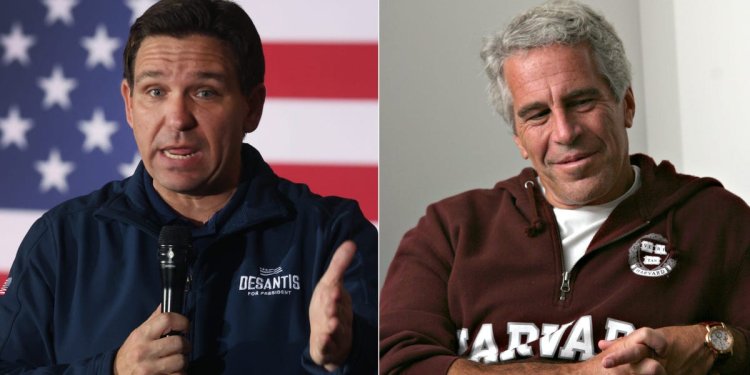DeSantis signs law to release records that could explain why Jeffrey Epstein got minimal charges in Florida
The new law will allow for the public release of the records of a Florida grand jury that brought a single charge against Epstein.

Scott Olson/Getty Images; Rick Friedman/Rick Friedman Photography/Corbis via Getty
- Gov. Ron DeSantis signed a bipartisan bill into law that unearth more Jeffrey Epstein records.
- The law will allow for the release of records from a 2006 Florida grand jury.
- Prosecutors allowed Epstein to plead guilty to only a single prostitution solicitation charge.
Florida Gov. Ron DeSantis on Thursday signed a bipartisan bill into law that could finally answer the lingering questions about 2006 grand jury probe that charged Jeffrey Epstein with just one criminal count.
"This is long overdue, but, again, we feel that we just can't turn a blind eye," DeSantis said shortly before signing HB 117 into law at a ceremony in Palm Beach. The law goes into effect July 1.
A Palm Beach grand jury investigation, which resulted in just one criminal count, of prostitution solicitation, has long been at the center of controversy for allowing Epstein to escape accountability for raping and sexually abusing girls.
Prosecutors decided to bring just a single victim before the grand jury even though law enforcement had concluded that Epstein sexually abused more than 30 girls, according to Miami Herald reporter Julie K. Brown's book "Perversion of Justice." A compensation program established following Epstein's death identified 136 of his victims. More recent litigation, against banks that were alleged to facilitate Epstein's sex-trafficking, put the figure at closer to 200 victims.
DeSantis stressed that in circumstances like those involving Epstein, the public has a right to see the evidence and testimony a grand jury heard.
The disgraced financier is not mentioned specifically in the law, but the bill was tailored to numerous allegations that Epstein paid underaged girls for massages and molested them. Victim advocates hope that the release of the Epstein grand jury records will shed light on why prosecutors brought limited charges, and what else they may have known at the time.
The Associated Press reported that a state judge decided not to release the records Thursday morning, citing the impending law. Instead, the judge ruled that any requests related to the Palm Beach Post's lawsuit for the records would have to wait until July.
Under the new law, a court could order grand jury evidence to be disclosed if the subject of the grand jury probe is deceased and the investigation was related "to criminal or sexual activity" between the target of the grand jury investigation and a minor. Epstein died by suicide in August 2019 after federal prosecutors in Manhattan charged him with sex trafficking minors.
The Palm Beach investigation is a major moment in the Epstein timeline, because it marked the first time that authorities investigated the financier for having sex with underage girls.
Amid the investigation, State Attorney Barry Krischer made the controversial decision to take the case against Epstein to a grand jury. The Palm Beach police chief was so outraged that the grand jury only charged Epstein with one count that the FBI got involved. The FBI later prepared a 53-page indictment against Epstein, but their probe was undercut by a deal Epstein's lawyers struck with then-US District Attorney Alex Acosta. In the end, Epstein spent just 13 months in jail, much of it spent on "work release" where he hung out in his office.
A 2019 Miami Herald investigation from Brown brought renewed attention to prosecutors' deals with Epstein. This led to a public outcry that forced Acosta, who had become President Donald Trump's Labor secretary, to resign. Federal prosecutors in Manhattan then opened a separate case into Epstein.
In January, a federal judge unsealed the names of roughly 170 of Epstein's associates amid a separate lawsuit between one of his accusers and his sex-trafficking partner, Ghislaine Maxwell.
What's Your Reaction?




















